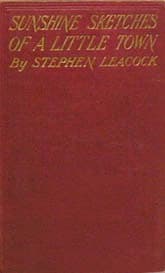Sunshine Sketches of a Little Town
Critique • Quotes • Text • At the movies
 First edition
First editionFirst publication
1912
Literature form
Story collection
Genres
Humour, satire
Writing language
English
Author's country
Canada
Length
Approx. 65,000 words
• Greatest Stories (for "The Marine Excursions of the Knights of Pythias")
Notable lines
In Canada I belong to the Conservative party, but as yet I have failed entirely in Canadian politics, never having received a contract to build a bridge, or make a wharf, nor to construct even the smallest section of the Transcontinental Railway. This, however, is a form of national ingratitude to which one becomes accustomed in this Dominion....
Many of my friends are under the impression that I write these humorous nothings in idle moments when the wearied brain is unable to perform the serious labours of the economist. My own experience is exactly the other way. The writing of solid, instructive stuff fortified by facts and figures is easy enough. There is no trouble in writing a scientific treatise on the folk-lore of Central China, or a statistical enquiry into the declining population of Prince Edward Island. But to write something out of one's own mind, worth reading for its own sake, is an arduous contrivance only to be achieved in fortunate moments, few and far between. Personally, I would sooner have written "Alice in Wonderland" than the whole Encyclopaedia Britannica.
— "Preface"
I don't know whether you know Mariposa. If not, it is of no consequence, for if you know Canada at all, you are probably well acquainted with a dozen towns just like it.
— First lines, "The Hostelry of Mr. Smith"
As for politics, well, it all seemed reasonable enough. When the Conservatives got in anywhere, Pepperleigh laughed and enjoyed it, simply because it does one good to see a straight, fine, honest fight where the best man wins. When a Liberal got in, it made him mad, and he said so,—not, mind you, from any political bias, for his office forbid it,—but simply because one can't bear to see the country go absolutely to the devil.
— "The Extraordinary Entanglement of Mr. Pupkin"
Sometimes he would go down at night to the offices of the bank below his bedroom and bring up his bank revolver in order to make an end of himself with it. This, too, he could see headed up in the newspapers as:
BRILLIANT BOY BANKER BLOWS OUT BRAINS.
But blowing your brains out is a noisy, rackety performance, and Pupkin soon found that only special kinds of brains are suited for it. So he always sneaked back again later in the night and put the revolver in its place, deciding to drown himself instead. Yet every time that he walked down to the Trestle Bridge over the Ossawippi he found it was quite unsuitable for drowning—too high, and the water too swift and black, and the rushes too gruesome—in fact, not at all the kind of place for a drowning....
That night Pupkin walked home on air and there was no thought of chloroform, and it turned out that he hadn't committed suicide, but like all lovers he had commuted it.
— "The Mariposa Bank Mystery"
There,—you hear it?—the long whistle of the locomotive, one, two, three! You feel the sharp slackening of the train as it swings round the curve of the last embankment that brings it to the Mariposa station. See, too, as we round the curve, the row of the flashing lights, the bright windows of the depot.
How vivid and plain it all is. Just as it used to be thirty years ago. There is the string of the hotel 'buses, drawn up all ready for the train, and as the train rounds in and stops hissing and panting at the platform, you can hear above all other sounds the cry of the brakesmen and the porters:
"MARIPOSA! MARIPOSA!"
And as we listen, the cry grows fainter and fainter in our ears and we are sitting here again in the leather chairs of the Mausoleum Club, talking of the little Town in the Sunshine that once we knew.
— Laast lines, "L'Envoi. The Train to Mariposa"
Critique • Quotes • Text • At the movies

